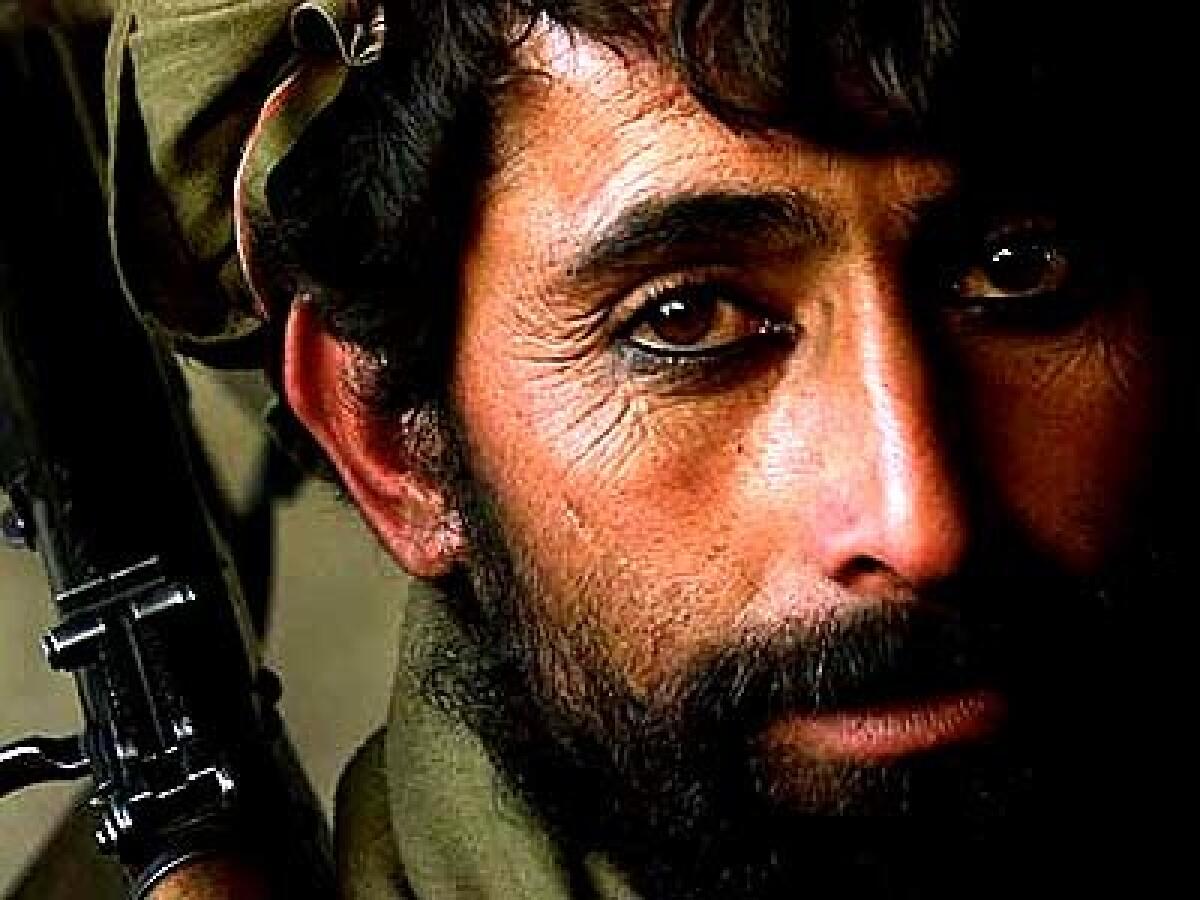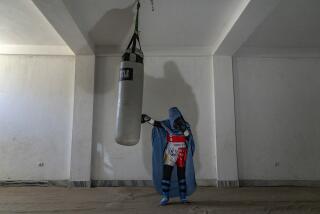Tide Turns With Aid of Defections

- Share via
GARARI MERZA KABIR, Afghanistan — It is a peculiar fact of an Afghan war that friends become enemies and suddenly friends again, always knowing that either one would have killed the other if they’d had the chance.
This constant shifting of alliances has long been Afghanistan’s curse, but may yet turn out to be its blessing. It is crucial to understanding why the anti-Taliban opposition, an alliance of warlords that was headed for defeat less than two months ago, is now suddenly in the capital, Kabul.
On the main road linking northern and southern Afghanistan through the Salang Pass, Taliban and opposition forces were in a standoff until 2 a.m. Monday, when two foes decided to revive a friendship that had begun more than 15 years ago.
Twelve hours later, Taliban commander Mohammed Aman Abed was leading 50 of his men up the Salang Pass that they had fought so bitterly over for years. They were heading to the front line north of Kabul, to battle the Taliban force from which they had just defected.
Abed, 24, and Del Aqa, 36, a Northern Alliance commander, rode side by side on horseback as Abed’s men trudged along behind. One pulled the commander’s sheep along by a cloth tether. Another carried the commander’s canary in a bird cage, gingerly stepping past a Taliban land mine left exposed in a pothole in the middle of the road.
They were men from different parts of Afghanistan, driven by loyalty to a new battlefront, and none found it the slightest bit strange that people who were trying to kill each other before sunrise were now marching off to war together as the sun set behind the mountains.
Aqa, the opposition Northern Alliance’s second in command in the strategic Salang Pass, found it a little offensive that a visitor would ask how Afghan enemies could be allies so easily.
“Don’t think us so simple,” Aqa said, and he smiled wryly.
Then he gestured toward a series of reinforced concrete bunkers, where fleeing Taliban fighters left behind heavy machine guns, anti-tank weapons and ammunition that will soon be turned against other Taliban soldiers.
“We made these bunkers during the fighting against Dostum,” Aqa said proudly.
He was referring to one of Afghanistan’s most notorious turncoats, Abdul Rashid Dostum, a former general under the Soviet-backed Communist regime who then switched to the moujahedeen factions that in 1992 overthrew President Najibullah, the Soviets’ puppet.
In January 1994, Dostum joined forces with moujahedeen warlord Gulbuddin Hekmatyar and turned against interim President Burhanuddin Rabbani, setting off a vicious civil war in Kabul that killed about 50,000 people and reduced much of the city to ruins before the Taliban seized the capital in 1996.
Dostum is now back with the Northern Alliance and on Friday helped to retake the northern city of Mazar-i-Sharif, his longtime fiefdom.
As Abed and his former Taliban fighters headed toward the Kabul front Monday afternoon, the Northern Alliance claimed that the defection of hundreds of other Taliban soldiers defending the city helped the opposition make rapid advances in an offensive launched that morning.
Like Abed, the fighters were mainly local commanders and their soldiers who joined the Taliban five years ago as the fundamentalist Islamic movement made stunning advances across Afghanistan to seize Kabul. The defectors were simply joining the winning side again.
Abed and his 600 soldiers were weak links in the Taliban chain, and had been for a long time. He is a Tajik born in the rugged Salang, as is Aqa, and the commanders’ ethnic blood and families’ ties proved stronger than loyalty to the mainly ethnic Pushtun Taliban movement.
Aqa met Abed when the latter was a child, during visits to the home of the boy’s brother-in-law, Aqa Sherin, who was once a famous commander of Northern Alliance troops in Parvan province, north of Kabul.
But as the capital was destroyed by warring factions in the 1990s and the Rabbani government slowly disintegrated along with the country it claimed to govern, Aqa Sherin was accused of plotting a coup.
Aqa Sherin spent several years in jail in the Panjshir Valley, and upon his release about a year ago quickly went over to the Taliban side and launched failed attacks on Northern Alliance forces. He is now a spent force in Kabul, a former commander with no soldiers, who may well be waiting for the phone to ring with an offer to switch sides again.
Abed secretly contacted Del Aqa a year ago to discuss returning to the anti-Taliban forces. “We wrote letters and they sent messages through the radio,” Aqa said.
But Abed didn’t decide to make his move until Sunday night, after weeks of U.S. airstrikes had improved the Northern Alliance’s fortunes. Some of his men made radio contact with alliance forces around 6 p.m. to signal the switch, but they needed a diversion. It was agreed that they would start a small battle about four hours later.
The two sides fired rocketpropelled grenades and machine guns across the front line until 2 a.m., without wounding or killing anyone, said one alliance soldier, Sher Mohammed, who mimicked the whoosh of rockets by hissing through the gap in his front teeth.
The fighting stymied those in Abed’s force who might oppose defection. “The ones who did not want to surrender did not have time to fight with the others,” he added. “They ran away.”
Aqa said he came through the damaged Salang Tunnel and reached the front around 1 a.m. Within the hour, the battle was over and the opposition had gained another ally. About 20 commanders and their forces defected in the region on Sunday and Monday, he claimed.
Abed was reluctant to talk about how the deal was worked out, because he was able to bring only 600 of his men with him and fears Taliban commanders will take revenge against those he left behind.
One who did come was a teenager sitting wrapped in a green Taliban-issue sleeping bag, trying to stay warm in the frigid mountain wind as he waited for the move to the Kabul front, several hours’ walk to the south.
Mohammed Din Babamir, 17, was sheltered by an overhang, one of a series built by Soviet forces on the highway about six miles northwest of the Salang tunnel to protect the roadway from avalanches and landslides. He said the Taliban came to Haidarabad, his village near the northern city of Mazar-i-Sharif, five months ago and press-ganged him and 30 or 40 neighbors.
“They took us from our houses and told us they would take us ‘to duty,’ ” Babamir said. “They said it would only be for 20 days or one month, but when we got here [at the front], we stayed for almost six months.
“They trained us very little,” he added. “Occasionally, we had one or two days of it, but no more.”
Babamir said he was never paid, had just two sets of street clothes to fight in and was posted at the top of a mountain about 12,000 feet above sea level. He thought the Taliban food was good, but he nonetheless was bitter because the regional commander, whom he identified as Mullah Shahzadah, never came to visit.
“No one called on us,” he said. “No one cared about us.”
The teenager looked as if he was fed up with war and the cold and wished he were heading north instead of south--back to his home village where the Taliban had already been defeated. Aqa insisted that none of Abed’s soldiers were prisoners and that they were free to leave.
“There is a general amnesty,” the alliance commander said.
But an Afghan soldier knows it is safer to point his weapon at whichever enemy his commander may choose. So Babamir rolled up his sleeping bag, picked up his Kalashnikov rifle and headed to the next front in a country that has been at war longer than he has been alive.
More to Read
Sign up for Essential California
The most important California stories and recommendations in your inbox every morning.
You may occasionally receive promotional content from the Los Angeles Times.










